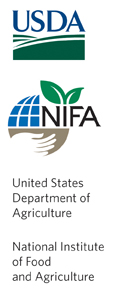Overview
In some areas of the Southwest and Pacific Islands region, water use has begun to exceed water recharge,
generating concern about depleting water resources.
Population growth in some areas of the region has increased demand, while periods of drought
regularly limit the supply.
The necessity for water conservation by agriculture, industry, and individuals is becoming more real every day.
The amount and time of precipitation on most agricultural lands in Region 9 is not adequate for
producing high crop yields.
Agricultural water management entails making decisions on irrigation and, if necessary,
drainage practices on farms. In this context, water conservation means irrigating in a manner
that results in low surface runoff from the field, and only the amount of water necessary to
leach excessive salts moving below the crop root zone.
Objectives
- Maintain the soil-water content of croplands within the range that is adequate to meet the crop need (evapotranspiration (ET) demand).
- Management decisions on irrigation systems are made with consideration of conservation options.
- Homeowners consider and practice water conserving practices in and around the home.
Projects Funded
Assessing and managing the health risks of irrigation water in the lower Colorado River basin
J. M. Fonseca, Yuma Agriculture Center, University of Arizona
C. A. Sanchez
S. Ravishankar
This project seeks to develop tools and guidelines for risk management decisions based on the microbial monitoring of surface derived irrigation water and assessing potential risks from using treated effluent for irrigation of food crops in the region.
Read More >>
CONTACT:
J. M. Fonseca
Phone: 928-782-3836
Fax: 928-782-1940
Email: jfonseca@ag.arizona.edu
Conservation of surface and ground water in a Western watershed experiencing rapid loss of irrigated agricultural land to development
R. Van Kirk
The project seeks to meet, at the watershed scale, NIWQP goals of developing water conservation strategies, promoting effectiveness of those strategies, and training the next generation of water professionals. We will pursue these goals in the Henry's Fork watershed of eastern Idaho and western Wyoming, where conversion of traditionally irrigated land to non-agricultural uses is presenting new water conservation and management challenges to irrigators, water managers and aquatic resource conservation agencies and organizations.
Read More >>
CONTACT:
Julie Davy
Phone: 707-826-4189
Email: hsuf@humboldt.edu
Coordinated Management of Water Quality Protection & Food Safety Initiatives in California Vegetable Production Conference
Mary Bianchi, UC Cooperative Extension San Luis Obispo
Kay Mercer, Southern San Luis Obispo and Santa Barbara Counties Agricultural Watershed Coalition
Dr. David Crohn, Department of Environmental Sciences UC Riverside
Coordinated management of water quality and food safety on-farm management practices was the focus of a conference held in San Luis Obispo, California in April 2007. Conference presentations, discussions, farm visits, and working groups used existing technical guidance to frame research and organizational objectives.
Read More >>
Abstract: http://ag.arizona.edu/region9wq/pdf/cali_abstract.pdf
Final Report: http://groups.ucanr.org/wqfsconf/
Press Release: http://news.ucanr.org/newsstorymain.cfm?story=971
CONTACT:
Mary Bianchi
Phone: (805) 781-5949
Fax: (805) 781-4316
Email: mlbianchi@ucdavis.edu
Developing a Potential Hazard Index for Nitrate in the Southwest States
Laosheng Wu and Christine French, University of California at Riverside
The goals of this project are to develop a nitrate hazard index (HI) specific for irrigated agriculture, and to provide education and training to help advisors, consultants, and growers use the index to improve water quality.
Read More >>
CONTACT:
L. Wu, L.
Phone: 951-827-4664
Fax: 951-827-4664
Email: Laosheng.Wu@ucr.edu
Economic and Hydrologic Trade-offs Between Water Consumption and Groundwater Recharge for Cover Crop Systems
W.W. Wallender, University of California at Davis
This project will investigate tradeoffs between water consumption and groundwater recharge at the field level in two ongoing experiments in California's Central Valley: the Sustainable Agriculture Farming Systems (SAFS) Project and Biologically Integrated Farming Systems (BIFS) Project. These projects are comparing cover-cropped systems with conventional systems in terms of soil quality, pest management, and other important biological parameters.
Read More >>
Abstract: http://ag.arizona.edu/region9wq/pdf/wallenderetal.pdf
CONTACT:
W.W. Wallender
Phone: 530-752-0688
Fax: 530-752-5262
Email: wwwallender@ucdavis.edu
Ground-Penetrating Radar, Development of a Vineyard Management Tool
Y.N. Rubin, University of California at Berkeley
The objective of our research is to develop surface Ground Penetrating Radar (GPR) methods for use as a field tool to provide information about soil heterogeneity and moisture content. GPR is a geophysical tool that uses high frequency electromagnetic signals to probe the subsurface.
Read More >>
CONTACT
Y.N. Rubin
Phone: 510-642-2282
Fax: 510-642-7476
Email: rubin@ce.berkeley.edu |



